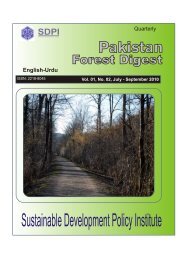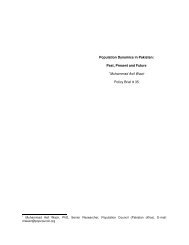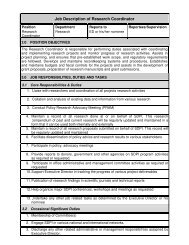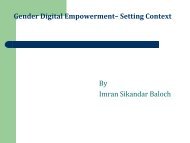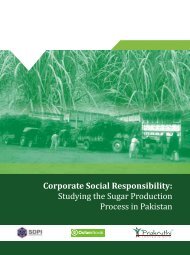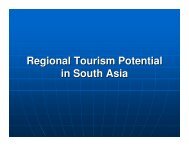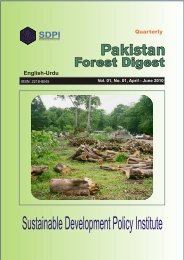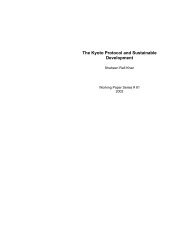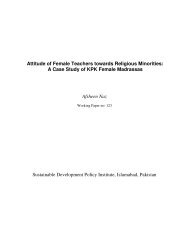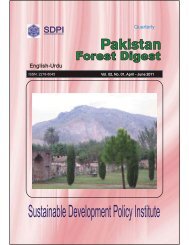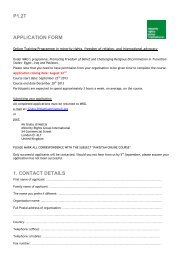Annual Report 2009-10 - Sustainable Development Policy Institute
Annual Report 2009-10 - Sustainable Development Policy Institute
Annual Report 2009-10 - Sustainable Development Policy Institute
- No tags were found...
Create successful ePaper yourself
Turn your PDF publications into a flip-book with our unique Google optimized e-Paper software.
<strong>Annual</strong> <strong>Report</strong><strong>2009</strong> - 20<strong>10</strong>gional, state, and individual securities. The deliberations will focus on the importance of individualsecurity through social sector development for a secure state, region, and for sustainedpeace.The Twelfth <strong>Sustainable</strong> <strong>Development</strong> ConferenceThe Twelfth <strong>Sustainable</strong> <strong>Development</strong> Conference looked at the six 'Fs' crisis of food; fiscal;fuel; frontiers; functional democracy and fragility of climate. Speakers examined and proposedviable strategies for sustainable development. It's duration was for three days from 21 to 23 December<strong>2009</strong> in Islamabad at the Best Western Hotel, with 23 panels including approximately<strong>10</strong>0 delegates from 11 countries including Bangladesh, China, India, Sri Lanka, Nepal, the Netherlands,Pakistan, Turkey, Germany, US, and the UK. The conference was well attended by anaudience of over 1,400 spread over the three days. It was widely praised for providing an importantplatform for discussion on a wide range of topics around sustainable development, as wellas for bringing together academics from a region characterized by disunity and poor regionalrelations. The conference received extensive coverage both in print and electronic media.The welcome speech was give by Dr. Abid Q. Suleri, Executive Director of SDPI, who warnedagainst the dearth of funding for research on sustainable development, both within the internationalcommunity and within Pakistan, in his opening address. Dr. Suleri's introduction was followedby remarks from the Chief Guest, Syed Naveed Qamar, Minister for Petroleum and NaturalResources. Mr. Qamar reiterated the government's commitment to democracy, stating thatsustainable development is not possible without sustainable democracy. The opening sessioncontinued with a keynote address delivered by Dr. Saba Gul Khattak, Member Social Sector,Planning Commission of Pakistan. Dr. Khattak spoke about accountability and violence, highlightingthe lack of accountability of states in relation to communal violence, pointing towards thetwo partitions of South Asia, to present violence in Afghanistan as well as militancy, military operationsand drone attacks inside Pakistan.Speaking during a concurrent panel on 'South Asia in 2060', panelists were of the view that thenext five years will decide what will happen in the next fifty years in South Asia. Chairing thesession, Dr. Adil Najam, the Frederick S. Pardee Professor for Global Public <strong>Policy</strong> from BostonUniversity, emphasized the present fragmentation as “the blip and not the historical trend” inSouth Asia, whereby regional trade constitutes only 5.5 percent and the region has been declaredby the Asian <strong>Development</strong> Bank as the least integrated region in the world. Panelists emphasizedthe youthfulness of South Asia's population, with much lower dependency rates thanChina or Europe, allowing South Asia to become a “global workforce”. Dr. Ishrat Hussain, FormerGovernor of the State Bank of Pakistan and presently the Director of IBA, Karachi, said that“investment in skill formation is more productive than investment in machinery and capital” andthat “research and development expenditure is pathetic”, warning that these investments arecrucial in securing the future of South Asia. Mr. Amitabh Mattoo, Professor at the Centre for InternationalPolitics at the Jawaharlal Nehru University, India, warned “We are at a tipping point.We could go in the direction of paradise or descend into hell." Other speakers who spoke on thispanel included Mr. Nihal Rodrigo, Former Sri Lankan Ambassador to China; and, Former SecretaryGeneral, SAARC, Colombo, Sri Lanka; Mr. Dipak Gyawali, Director of the Nepal Water ConservationFoundation and Pragya of the Royal Nepal Academy of Science and Technology,Kathmandu, Nepal; and, A. K. Enamul Haque, Executive Director, Economic Research Groupand Professor and Head of Economics, United International University, Dhaka, Bangladesh.In the afternoon session on 'The prospects of normalization of Kashmir' chaired by General(retd.) Talat Masood. Panelist Shah Ghulam Qadir, Speaker of the AJK Assembly, said that conflictmanagement had failed to produce any tangible results over the 62-year period of conflict.Yet panelists agreed that there is a possibility as well as a need for a 'win-win-win' situation forall conflicting parties, including not only India and Pakistan, but also Kashmir. Panelists urgedfor a shift in focus from the territory of Kashmir to the people of Kashmir, and noted that the po-54S u s t a I n a b l e D e v e l o p m e n t P o l I c y I n s t I t u t e



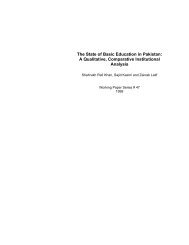
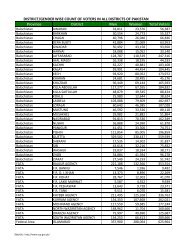
![(October - December, 2010) [13th SDC Special Bulletin]](https://img.yumpu.com/50118608/1/184x260/october-december-2010-13th-sdc-special-bulletin.jpg?quality=85)
